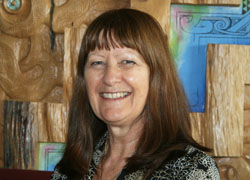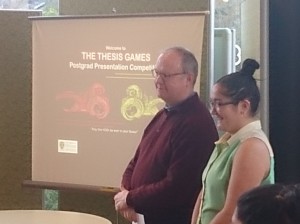New Research Assistant for Te Tumu
Te Tumu is really pleased that Gianna Leoni (Ngati Kuri and Ngai Takoto) has now joined the staff as a Research Assistant for 2015. Gianna has long been a “fixture” at Te Tumu as a student and tutor, and is also currently putting the last touches on her doctoral thesis on the use of te reo Māori in government departments. As RA, Gianna will be working primarily with the editors of Te Tumu’s new textbook (currently being written) for its MAOR102: Māori Society paper. Gianna will also be assisting Te Tumu staff with their own individual research projects.
Nau mai, haere mai, Gianna.
In the meantime Gianna is also helping coordinate Te Tumu’s 25th Anniversary, which will run on 28-29 May. This is going to be a great weekend for former and present staff and students, and will be immediately followed by the 25th Anniversary of the Māori Centre/Te Huka Mātauraka (30-31 May). If you haven’t already registered for these events, click here now.
Waitangi Day Lecture
Te Tumu staff member, Lachy Paterson, will be giving a talk at the Dunedin Public Library on Waitangi Day. Click here for details.
Te Tumu academic wins Ngā Pae Fulbright visiting scholarship
Congratulations to Dr Matiu Rātima, one of our Māori-language kaiako, who has recently been awarded a Ngā Pae Fulbright visiting scholarship to undertake research at the Mānoa campus of the University of Hawai`i, in Oahu. Matiu will be away from 10 August 2015 to 10 January 2016 during his Research and Study Leave.
While in Hawai’i where he’ll be working with Dr Keao Nesmith of the Kawaihuelani Center for Hawaiian Language on their research project titled, “Communicative Language Teaching for Indigenous Language Revitalisation”.
Globally there are few indigenous languages that are not under threat of decline or extinction. It has been estimated that of the world’s 6,912 known languages, 95% of these are spoken by less than 6% of the population. Experts forecast that less than 10 percent of the world’s living oral languages (in the year 1992) will still be spoken by 2092. Urgent action, underpinned by good research, is vital to stop this decline.
Matiu’s research will examine four key questions.
1. How are indigenous languages being taught within universities?
2. What pedagogies are being applied?
3. What constitutes ‘best practice’ in indigenous language teaching? And;
4. How can Communicative Language Teaching help to produce speakers of indigenous languages?
The research focuses on three case studies, the teaching in universities of the Māori, Hawaiian and Tahitian languages.
Fulbright New Zealand promotes “mutual understanding between the peoples of New Zealand and the United States of America by means of educational and cultural exchange”, and offers a range of grants for New Zealand academics and graduates to research in America.
More recognition for Dr Karyn Paringatai
Te Tumu academic, Dr Karyn Paringatai, now has a role helping support Māori postgraduates across the university. Following on from the great work done by Anaru Eketone (of Sociology, Gender & Social Work), Karyn has been appointed as Māori Postgraduate Student Advisor, a part-time position at the University’s Graduate Research School. In many ways, this will be an extension of the work that Karyn has already been doing with Te Tumu postgraduates. Click here for the Otago Bulletin Board story.
Karyn’s role is supported by funding from Ngā Pae o te Māramatanga. She has just come back from leading a group of Otago postgraduates to Ngā Pae’s Māori and Indigenous Doctoral Conference held at Maketū Marae at Kāwhia where, I understand, everyone was blown away by our students’ presentations.
Profiling: Jenny Bryant-Tokalau
It is an occassional feature of Te Tumu’s Research Blog that we profile members of our staff. This post features Associate Professor Jenny Bryant-Tokalau, who, amongst her many other activities, is currently Programme Coordinator for Pacific Islands Studies and Chair of the Postgraduate Committee in Te Tumu.
Jenny Bryant-Tokalau (or Jenny Bryant as she was then known) was born in Dunedin and is descended from a mixture of British migrants who landed on the Otago coast between Moeraki and Surat Bay in the nineteenth century. Jenny’s mother grew up in North East Valley and was a secretary and later a teacher, and her Dad was a migrant rabbiter, saddler then electric linesman from Central Otago. Jenny is the eldest of three sisters and their Mum had hopes for them to be ‘like the Bronte sisters’. Fortunately this did not (quite) happen.
Jenny first visited the Pacific as a high school student when she was lucky enough to go on a school French trip to Noumea, New Caledonia. Later as an undergraduate Geography student, here at Otago, she went on a student exchange trip to Fiji for three months to carry out voluntary work at the National Archives in Suva. After a whole row of very old and decaying files about the island of Rotuma fell on top of her, Jenny decided to return the following year to gather material for her Post graduate dissertation. Three months of visiting Rotuman island families in the low cost housing settlements in Suva, the gold mine in Vatukoula and in the first Fiji capital of Levuka led to a successful dissertation outcome, and Jenny was on her way to a life of interesting research.
In 1975 Jenny was employed as an assistant lecturer in Geography at the University of Papua New Guinea. Her classes were large, and across the spectrum of environment, human geography and cartography. During her three years there Jenny travelled widely taking students on both biogeography and urban geography in the Highlands, visiting archaeological sites and carrying out her own MA research work on low-income housing and squatting in Port Moresby, Madang and Rabaul. Jenny also worked closely with the Lae City Council and the PNG Housing Authority. Although she loved PNG where life was very exciting and varied, a PhD and job beckoned at Monash University in Melbourne. There she tutored and lectured in Geography whilst working on her PhD on Aboriginal Housing with two years of assistance from the Australian Institute of Aboriginal Studies. Again, there was much fieldwork involved with long hours driving around Victoria from the northwest corner where the small town of Robinvale is located (where Jenny picked grapes and lived in a tent in the summer to fund her research), to the south west to the Framlingham Aboriginal Trust community, to Melbourne where she worked with the Aboriginal Housing, Health and Legal boards. Part-time consultancies with the Ministry of Housing and representations to the House of Representatives on Aboriginal housing filled in her spare time when not writing the PhD dissertation.
But the Pacific beckoned again. With the PhD almost completed Jenny took a job in Geography at the University of the South Pacific in Fiji where apart from teaching, consultancies, and running an environmental NGO she carried on with her research. At first, continuing from her by now major interest in housing for the poor, she became involved with assessing the size and conditions of squatter settlements across the country, and training students in such assessments. This lead to an involvement in growing poverty and inequalities, an appointment to the Fiji government’s committee on poverty, and then to more research on land and encroaching coastal environmental issues around the squatter settlements. All through the years at USP Jenny carried out work for various UN and regional agencies, especially the South Pacific Regional Environment Programme. Eventually she was kidnapped by UNDP and spent the next six years travelling around the Pacific and Asia working as a Sustainable Development Adviser and Head of Global Environment Facility programmes. In 2002 Jenny and family decided to return to NZ, to enable her husband Filipo to complete his PhD and for Jenny to take care of her mother. On Tino joined George St Normal School and Jenny worked firstly in Anthropology before joining Te Tumu. Her research continues in the Pacific, especially her other home of Fiji where she works largely around coastal urban land (the qoliqoli) and the urban poor, as well as on artificial islands as a response to climate change. Jenny has recently been appointed as an adjunct professor at USP where she maintains very close ties.
Click here to see Jenny’s research outputs, grants & distinctions, and supervisions on her official staff page.
Two great talks coming up
This Wednesday, 1 October 2014, 5:30pm – 7:00pm in Archway 2 Lecture Theatre (This is a Public Lecture, open to all.)
The Fulbright/Te Tumu lecture by Sir Tamati Reedy (Ngāti Porou)
“Ngā Wai Whakaata o Hine-Kauorohia: The Reflecting Waters of Hine Kauorohia”
The Māori goddess Hine-kauorohia allows us to look into the stillness of her reflecting waters to see the past with clarity, gaze at ourselves in the shimmering present, and with a finger-touch, fathom a ruffled glimpse of the future.
The mauri, the life-essence, of Aotearoa New Zealand is our sense of nationhood. What is it? Who says so? I will focus on the themes of our history – Māori and Pākehā – reflecting on the hopes and promises of our partnership under the Treaty of Waitangi. I will comment especially on themes of our relationships: economic (land and people), socio-cultural (the realities of race-relations, identity and democracy), educational (the way to advantage), political (levers of power and privilege) and of course, my place as Māori in the future Aotearoa New Zealand.” – Sir Tamati Reedy
——-
Dr Jim Williams giving the Te Tumu Seminar on Wednesday 8.
To watch this LIVE, click here.
Profiling: Jim Williams
Te Tumu’s Research Blog will be posting occasional profiles of our academic staff, highlighting their research interests and publication.
Introducing Dr Jim Williams.
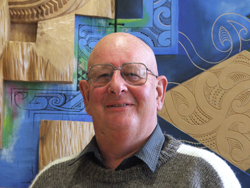 Jim is a Senior Lecturer and has been with Te Tumu since 1992.
Jim is a Senior Lecturer and has been with Te Tumu since 1992.
Research direction
* Ngāi Tahu history and language.
* Resource management including mahika kai, and comparisons with other Indigenous peoples.
Jim is currently exploring the dynamics of oral transmission of traditional stories, with a view to publishing a book, which will examine the extent to which Māori families pass on Māui stories, compared with Navajo and their stories about Mai’I (coyote – the trickster that predominates amongst Native Americans). A secondary theme will be looking at Europeans attitudes to those stories.
Jim is most interested in talking to prospective students about comparison of traditional ways with the views of contemporary Māori.
Recent supervisions
PhD
Delyn Day, “Te Awhio-Rangi: Te Toki Mata Ngero o Te Ao Whetu” 2009 – 2013
Anne-Marie Jackson, “The Taiapure Process and to What Extent it Needs to be Altered to Achieve Tangata Whenua Objectives”, 2009 – 2011
David McKay, “Indigenous Perspectives in Environmental Education” 2009 – 2013
MA
Henare Mita, “The Ngāi Tahu Claims Settlement Act 1998: The Quest for Ngāi Tahu Tino Rangatiratanga” 2008 – 2009
Katrina Bryant, “Hauā Matau Māori”, 2012 – 2014
BA(Hons)
Hori Barsdell “Pā” 2014.
Selected Publications
Book Chapters
(2014) “Food and the Maori” in Encyclopaedia of the History of Science, Technology and Medicine in Non-Western Cultures, Springer, Dordrecht
(2010) “Towards a Model for Indigenous Research on traditional topics” in Hokowhitu, B., Kermoal, N., Andersen, C., Reilly, M., Rewi, P. & Petersen, A. (2010, Indigenous Identity and Resistance: Researching the Diversity of Knowledge. Dunedin: University of Otago Press. Dunedin
Refereed Journal articles
2014 Williams, Jim 2014; “He Aitua nā Tamatea”, in Te Pouhere Kōrero Journal, Vol. 7, Pp.47-56.
2013 Williams, Jim 2013; “Juxtaposed Narratives of “The Battle of Crowheart Butte”, in Ethnohistory, Vol. 60 (4) Fall 2013, Pp 567-579.
2012 Williams, Jim 2012; Ngāi Tahu Kaitiakitanga, in MAI Journal 2012, Volume 1 (2):89-102.
2010 Williams, Jim 2010; ‘Mahika kai: THE HUSBANDING OF CONSUMABLES BY MĀORI IN PRE_CONTACT TE WĀIPOUNAMU”, in Journal of the Polynesian Society, Vol. 119 (2) Pp 149-180
2006 Williams, Jim 2006; ‘Resource management and Māori attitudes to water in southern New Zealand’, in New Zealand Geographer Vol 62:75-82
Contact details
Please feel free to call in or make contact with Jim to discuss supervision.
Room Richardson South Tower, Rm 4S7
Phone 64 3 479 7385
Email jim.williams@otago.ac.nz
Journal News
Dr Lyn Carter is a Senior Lecturer in Te Tumu, and the Coordinator of our Indigenous Development programme.
Marginalisation occurs when a group of people are pushed to the periphery of a society. Many Māori reside at the margins of ‘mainstream’ society, while others are at the margins of Māori society. The present paper explores how ‘by Māori, for Māori’ research and evaluation can create spaces for voices from the margins to be heard. The paper arose out of a series of hui in which papers on the notion of marginalisation and Māori were presented and discussed, along with the broader topic of research ethics and protocols. Three themes that emerged from these hui are considered in this paper: relationships between researchers and participants/communities, researchers knowing themselves, and the safety aspects inherent within tikanga. The discussion of these themes draws upon the papers that were written for this project, the feedback from hui participants (researchers, students, health professionals, government workers, community providers), and local and international literature on research ‘by and with’ indigenous peoples. In making the ‘knowing’ we hold about these issues more explicit, this paper aims to generate more discussion as well as provide some small guidance for those who may be new to this thing called ‘research’.
The Journal of the Polynesian Society has been going for a little longer…
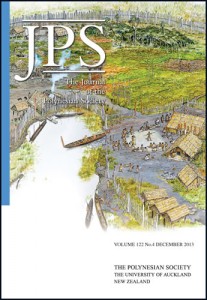 9 Reasons to Publish in the Journal of the Polynesian Society
9 Reasons to Publish in the Journal of the Polynesian Society
- For nearly 125 years, an international forum for the dissemination and discussion of cross-disciplinary research of and by Pacific peoples (broadly defined), past, traditional, and contemporary.
- Submissions welcomed from anthropology, linguistics, history, politics, sociology, visual arts and material culture studies, archaeology, biological anthropology, indigenous studies, and cultural geography
- Issues published quarterly, peer-reviewed; full length research articles (up to 15,000 words) and shorter communications
- Member of CrossRef index service, articles DOI-supported, Journal of Citation Reports rated
- Rapid submission-to-print turn-around time
- Guest-edited Special Issues welcomed & available for one-off purchase
Links:
Inaugural Te Tumu Postgraduate “Thesis Games”
We all know how difficult it can be to talk about our research, particularly when we have to do it succinctly. Te Tumu’s postgrad students were put to the test today with our first inaugural “Thesis Games”, with each presenting their research within about three minutes.
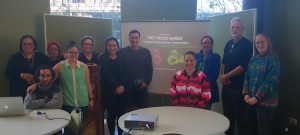
Click to enlarge. From left, Tangiwai Rewi, Hori Barsdell, Lana Arun, Gianna Leoni, Marcelle Wharerau, Ane Tatu, Tyson Tautari, Suzanne Duncan, Tawini White, John Birnie, Marsa Dodson.
The topics were many and varied: Tawini White: “He Manawa Hapū” (on hapū identity in Te Rarawa); Tyson Tautari: “Dogs Tale” (on the Polynesian dog); Ane Tatu: “Are you Dongan or Tongan? An examination of the ways in which New Zealand born and raised Tongans self-define and experience anga fakatonga (the Tongan way of life) and being Tongan”; Hori Barsdell: “What is the Significance of Pā Today?”; Lana Arun: “Archaeology and Tikanga” (on how Māori knowledge fits into the archaeoly profession; Marcelle Wharerau: “You Maaris get everything” (on perceptions of Māori privilege at university); Tangiwai Rewi: “Maaku anoo e hanga tooku nei whare…” (on intergenerational knowledge transfer within Waikato); John Birnie: “What if the mountain won’t come to Mohammed? Learner-centredness for adults learning te reo Māori”; Marsa Dodson: “Mixed blessings: Oral Histories of the War Children Born to US Servicemen and Indigenous Cook Islanders”; Gianna Leoni: “Power to Policy” (on the use of te reo Māori within government departments); and Suzanne Duncan: “Where is the whanau?” (on whānau involvement within the Māori economy).
There was a great turnout of people, including a number of Te Tumu under-graduates. All the speakers were amazing and engaged the audience. Congratulations to the winners: Ane Tatu for Honours level, Marcelle Wharerau for Masters Level, and Gianna Leoni for PhD level.
Such was the success, Te Tumu is sure to hold another such event next year. There is even talk of something similar for staff.
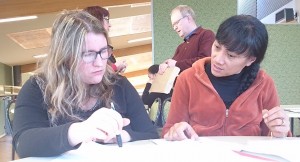
Special thanks to our judges, Shiobharn Smith, Māori, Pacific & Indigenous Subject Librarian, and Esme Eteuati, Pacific Islands Student Support Officer (Humanities).
Dr Karyn Paringatai’s success celebrated.
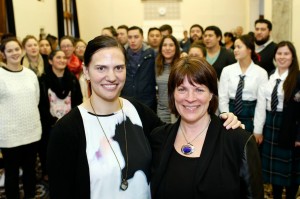
Te Tumu lecturer, Dr Karyn Paringatai and Professor Harlene Haynes, Vice Chancellor of the University of Otago.
On Monday night, the Vice-Chancellor celebrated Te Tumu staff member, Dr Karyn Paringatai’s success, with an event attended by many people from within the university, including Te Tumu staff and students. See the Otago Bulletin story here.
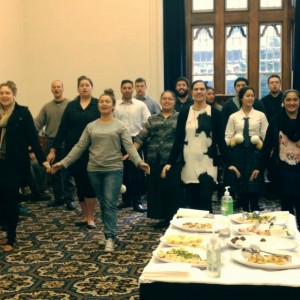
Indigenising the Academy – performing Ngoi Pewhairangi’s “Whakarongo” in the University of Otago’s Council Chambers to celebrate the success of Dr Karyn Paringatai.
Karyn won New Zealand’s top tertiary teaching award recently in Wellington, the Prime Minister’s Supreme Award for Tertiary Teaching Excellence, based on utilising the pre-contact Māori pedagogy of teaching in complete darkness, which has proved to be outstandingly successful in her performing arts paper, MAOR108 Waiata: Te Tīmatanga. Listen to the Radio NZ interview and Dunedin Television item in which Karyn explains her teaching practice.
Karyn has undertaken significant research to ensure that her teaching in the dark, and has just published on this ‘A Return to the “Dark Ages”’ in the journal Akoranga 10 (2014).
Just this week Karyn also employed the same methods in a guest lecture for the 900 students of MAOR102: Māori Society, showing that this pedagogy can be applied to more than just performing arts. She is planning to continue to use and develop “teaching in the dark” and publish more on this research.

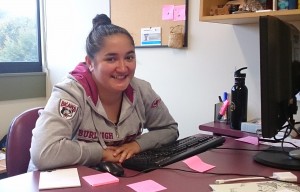
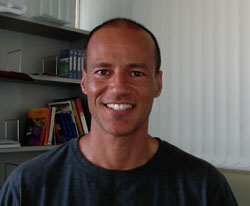
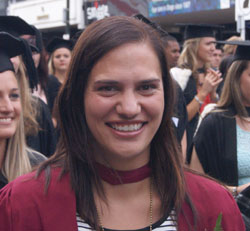
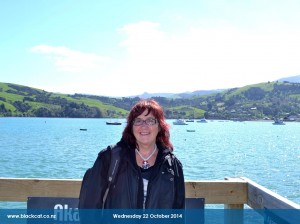
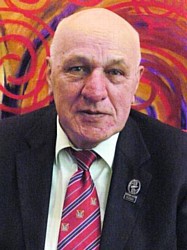
![Jim Williams[1]](https://blogs.otago.ac.nz/tetumuresearch/files/2014/07/Jim-Williams1-300x207.jpg)
